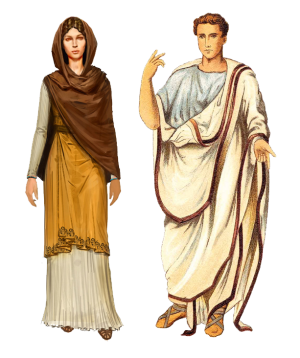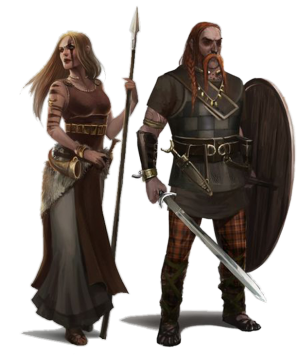mNo edit summary |
m (The LinkTitles extension automatically added links to existing pages (<a target="_blank" rel="nofollow noreferrer noopener" class="external free" href="https://github.com/bovender/LinkTitles">https://github.com/bovender/LinkTitles</a>).) |
||
| (6 intermediate revisions by the same user not shown) | |||
| Line 1: | Line 1: | ||
= Fashion in the | = Fashion in the Roman Period = | ||
During this period roman fashion is the trend for rich men and women in Britain. Earlier Iron Age clothes become obviously inspired by the Romans and their fashion. Still, a lot of the simple Iron Age clothing remains. '''Clothes from this period usually go out of fashion every 5-10 years.''' | During this period roman fashion is the trend for rich men and women in [[Britain]]. Earlier Iron Age clothes become obviously inspired by the [[Romans]] and their fashion. Still, a lot of the simple Iron Age clothing remains. '''Clothes from this period usually go out of fashion every 5-10 years.''' | ||
== Roman Fashion == | == Roman Fashion in the Roman Period== | ||
[[File:roman_c.png|300px|right]] | [[File:roman_c.png|300px|right]] | ||
| Line 11: | Line 11: | ||
Roman slaves wear nothing or very little at all, although the hard british weather forces even the slaves to wear thick woolen clothes. | Roman slaves wear nothing or very little at all, although the hard british weather forces even the slaves to wear thick woolen clothes. | ||
= | <h2 style="clear:both">[[Cymric]] Fashion in the [[Roman Period]]</h2> | ||
[[File:cymric.png|300px|right]]In large part of Britain the old tribal ways had not been so easily swept away by the roman influence. Tribal pride was common and many kept to the old ways. Others were impressed by the new roman clothes, but could not afford or did not live near the roman trade routes. | [[File:cymric.png|300px|right]]In large part of [[Britain]] the old tribal ways had not been so easily swept away by the roman influence. Tribal pride was common and many kept to the old ways. Others were impressed by the new roman clothes, but could not afford or did not live near the roman trade routes. | ||
Men usually wore long pants in his tribal patterns a short tunic to handle the cold on his upper body. Often nothing at all was worn on the upper body and instead the skin was painted or tattooed in patterns important to the man’s family. | Men usually wore long pants in his tribal patterns a short tunic to handle [[The Cold|the cold]] on his upper body. Often nothing at all was worn on the upper body and instead the skin was painted or tattooed in patterns important to the man’s family. | ||
Women wore a long underskirt with cloth draped over it. They usually kept the hair loose. | Women wore a long underskirt with cloth draped over it. They usually kept the hair loose. | ||
Latest revision as of 08:05, 19 October 2017
Fashion in the Roman Period
During this period roman fashion is the trend for rich men and women in Britain. Earlier Iron Age clothes become obviously inspired by the Romans and their fashion. Still, a lot of the simple Iron Age clothing remains. Clothes from this period usually go out of fashion every 5-10 years.
Roman Fashion in the Roman Period
In cities or at court men wore long tunics and at times a toga over it.
Women’s fashion changes more than men during the period, but to any significant degree. In cities or at court they wore long and open dresses in light fabric.
Roman slaves wear nothing or very little at all, although the hard british weather forces even the slaves to wear thick woolen clothes.
Cymric Fashion in the Roman Period
In large part of Britain the old tribal ways had not been so easily swept away by the roman influence. Tribal pride was common and many kept to the old ways. Others were impressed by the new roman clothes, but could not afford or did not live near the roman trade routes.
Men usually wore long pants in his tribal patterns a short tunic to handle the cold on his upper body. Often nothing at all was worn on the upper body and instead the skin was painted or tattooed in patterns important to the man’s family.
Women wore a long underskirt with cloth draped over it. They usually kept the hair loose.

